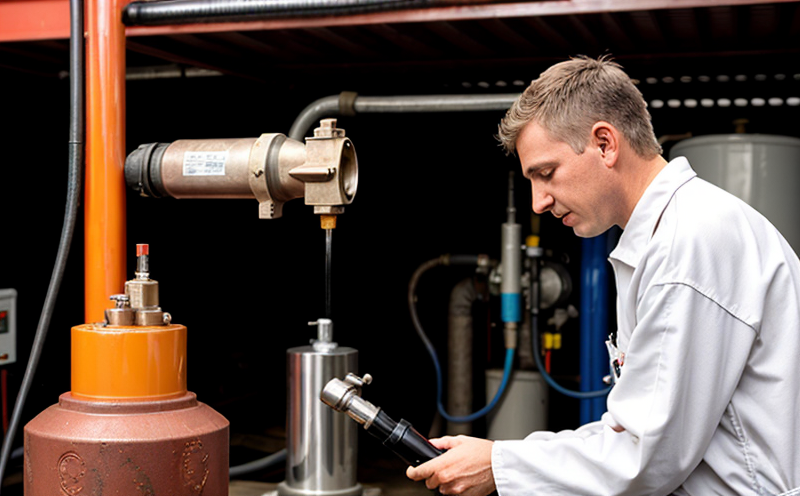ASTM D3703 Organic Nitrogen Testing in Aviation Fuels
The ASTM D3703 method is a critical testing procedure used to determine the total organic nitrogen content in aviation fuels. This test is essential for quality assurance and compliance with industry standards, particularly in the aerospace sector where fuel purity directly impacts engine performance and operational safety.
Organic nitrogen compounds play a significant role in fuel stability, combustion efficiency, and overall fuel quality. The presence of excessive organic nitrogen can lead to fouling of fuel system components, reduced engine life, and potential operational issues during flight. Conversely, insufficient levels may compromise the fuel's ability to support combustion, leading to performance degradation.
The ASTM D3703 test measures both primary and secondary amines in aviation fuels using an oxidative coupling reaction followed by titration with silver nitrate solution. This method allows for accurate quantification of organic nitrogen compounds, providing critical data for fuel certification and quality control.
For aerospace and aviation industries, ensuring compliance with ASTM D3703 is not merely a best practice but often a regulatory requirement. This test helps in maintaining the integrity of fuel supplies, thereby supporting safe and reliable aircraft operations.
The procedure involves several key steps: sample preparation, which includes dilution and filtration to ensure accurate measurement; reaction setup where fuel samples are treated with nitric acid and hydrogen peroxide; and final titration using silver nitrate. Each step is meticulously performed to avoid contamination or loss of organic nitrogen compounds.
Understanding the significance of ASTM D3703 in aviation fuels involves recognizing its role in maintaining engine health, enhancing combustion efficiency, and ensuring compliance with international standards such as ISO 15218-1:2016. This test is particularly important for airlines, airports, and aircraft manufacturers who must adhere to strict quality control protocols.
The accuracy of the ASTM D3703 method is paramount in aviation fuel testing, making it a cornerstone of quality assurance programs. By leveraging this technique, laboratories can provide reliable data that supports informed decision-making processes within aerospace companies and regulatory bodies.
Scope and Methodology
| Step | Description |
|---|---|
| Sample Preparation | Dilution of fuel samples with distilled water followed by filtration to remove particulates. |
| Reaction Setup | Treatment of diluted samples with nitric acid and hydrogen peroxide for the oxidative coupling reaction. |
| Final Titration | Determination of organic nitrogen content using silver nitrate solution through titration. |
The ASTM D3703 method is designed to ensure accurate measurement of total organic nitrogen in aviation fuels. This comprehensive approach guarantees reliability and consistency, which are crucial for maintaining the highest standards of fuel quality.
Benefits
Ensures compliance with international standards such as ASTM D3703 and ISO 15218-1:2016.
Supports safe and reliable aircraft operations by maintaining engine health and combustion efficiency.
Enhances fuel stability, reducing the risk of fouling in fuel systems.
Aids in meeting regulatory requirements set forth by aviation authorities worldwide.
Provides critical data for quality control programs within aerospace companies and airports.
Facilitates informed decision-making processes to optimize fuel performance and safety.
The benefits of ASTM D3703 testing extend beyond mere compliance; they contribute significantly to the overall reliability and safety of aviation fuels, thereby supporting a robust aerospace industry ecosystem.
International Acceptance and Recognition
ASTM D3703 is widely recognized by major aviation authorities such as the Federal Aviation Administration (FAA) and European Union Aviation Safety Agency (EASA).
The test method is also accepted by International Civil Aviation Organization (ICAO), which sets global standards for civil aviation.
Compliance with ASTM D3703 ensures compatibility with international fuel specifications, including those outlined in ISO 15218-1:2016.
The method is frequently used by airlines and airports to ensure consistent quality across global operations.
Given its widespread acceptance and recognition, ASTM D3703 organic nitrogen testing has become a standard practice in the aerospace sector. Its global applicability underscores its importance in maintaining high standards of fuel quality and operational safety.





